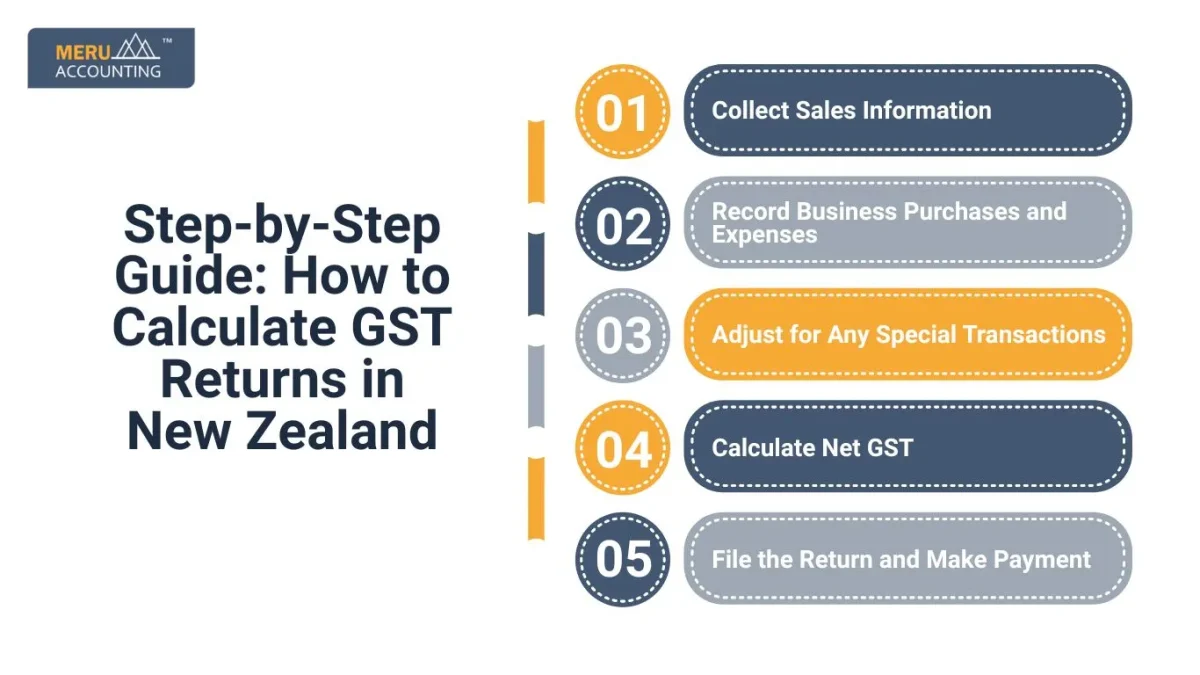Calculating Your GST Returns for New Zealand: How to Calculate GST Returns
Understanding how to calculate GST returns is crucial for all businesses registered for GST in New Zealand. Filing accurate returns ensures compliance with the Inland Revenue Department (IRD) and avoids costly penalties. In this guide, we’ll walk you through everything you need to know to calculate GST in NZ, including a step-by-step process, tips, and common questions.
What is a GST Return?
GST (Goods and Services Tax) in New Zealand is a broad-based tax on spending. A few things are not taxed, like rent from private homes, gifts, gold, and some financial services. Since most goods and services are taxed, GST brings in 31.4% of all taxes, making New Zealand one of the top OECD nations for tax as a share of GDP.
A GST return is a report of all GST charged and paid. It must be sent to Inland Revenue by registered businesses. It shows your sales, purchases, GST paid, and GST owed. Most businesses file returns every two months, though some may file more often.
How to Work Out GST in New Zealand
The standard GST rate in New Zealand is 15%. To calculate GST:
- Add up GST collected from sales (output tax).
- Add up GST paid on business expenses (input tax).
- Subtract input tax from output tax.
The difference is the GST you owe to the IRD. If the input tax is higher, you may be eligible for a refund.
Late Fees and Interest
If you pay late, IRD charges penalties and interest. These are not claimable and must be paid in full.
GST for Different Types of Sellers
- Regular Sellers: Pay GST on sales and claim GST on purchases.
- Composition Sellers: Pay a fixed GST rate on sales, with no input credit allowed.
When Do You Need GST Registration?
You must register for GST if your annual turnover exceeds NZ$60,000. Some businesses must register regardless of revenue. Registration usually takes 2–6 working days.
What is GST Deduction?
GST in New Zealand does not have CGST, SGST, or IGST (as in other countries), but TDS (Tax Deducted at Source) applies to specific contract payments. Always ensure GST is correctly deducted and paid to IRD.
Step-by-Step Guide: How to Calculate GST Returns in New Zealand
1. Collect Sales Information
- Gather all invoices for goods and services sold during the GST period.
- Calculate the total sales (excluding GST).
- Multiply by 15% to get the output GST.
2. Record Business Purchases and Expenses
- Collect all business expense invoices.
- Ensure supplier is GST-registered and invoice is valid.
- Calculate total input GST.
3. Adjust for Special Transactions
- Account for bad debts, private use, asset sales.
- Add GST paid on imports.
- Exclude GST for exempt or zero-rated supplies.

4. Calculate Net GST
Net GST = Output GST – Input GST ± Adjustments
If positive, you pay IRD. If negative, you get a refund.
5. File the Return and Make Payment
- Log in to myIR.
- Fill out the GST return online.
- Make payment or wait for refund based on net GST.
Example: How to Calculate GST in NZ
| Description | Amount (Excl. GST) | GST (15%) | Total (Incl. GST) |
|---|---|---|---|
| Sales | $20,000 | $3,000 | $23,000 |
| Purchases/Expenses | $10,000 | $1,500 | $11,500 |
Net GST = $3,000 – $1,500 = $1,500 to be paid to IRD.
How Can an Accountant Help?
GST compliance can be complex. Accountants can help:
- Ensure timely and accurate filing
- Minimize errors and avoid penalties
- Maintain proper financial records
- Interpret rule changes
Important Tips to Accurately Calculate GST in New Zealand
- Keep records updated regularly
- Use accounting software like Xero or MYOB
- Always collect valid tax invoices
- Reconcile bank statements with your accounting data
- Keep GST records for at least seven years
Adjustments That May Affect Your GST Returns
- Bad Debts: Reduce output GST on unpaid sales
- Private Use: Adjust for non-business portions
- Zero-Rated Exports: GST rate is 0%
- Asset Sales: Include GST on business asset sales
- Imported Goods: Include customs GST
Penalties for Incorrect or Late GST Returns
- Late filing fees
- Interest charges
- Shortfall penalties
- IRD audits and reviews
Using Accounting Software to Calculate GST in NZ
Popular tools include:
- Xero
- MYOB
- QuickBooks
These software options:
- Auto-calculate GST
- Generate reports
- Enable direct IRD filing (in some cases)
GST Filing Checklist
- Verify all sales and purchase invoices
- Review GST on imports
- Account for zero-rated and exempt supplies
- Apply necessary adjustments
- Calculate Net GST
- File and pay on time
Filing GST returns is essential for every registered business in New Zealand. When done right, it helps avoid IRD penalties, keeps cash flow under control, and ensures legal compliance. Meru Accounting offers expert GST services in New Zealand to help businesses file correctly and stay stress-free.
FAQs
- 1. What is the GST rate in New Zealand?
- The GST rate is 15% on most goods and services.
- 2. Do I need to register for GST?
- Yes, if your turnover exceeds NZD 60,000 in 12 months.
- 3. What happens if I overpay GST?
- You may receive a refund from IRD in your next GST return.
- 4. Can I claim GST on all expenses?
- Only if they relate to taxable business activities and you have a valid tax invoice.
- 5. When are GST returns due?
- They are usually due on the 28th day after each filing period ends.
- 6. Can I calculate GST in NZ manually?
- Yes, but using accounting software is more efficient and reduces errors.
- 7. Are all sales subject to 15% GST?
- No, exports and some financial services are zero-rated or exempt.








